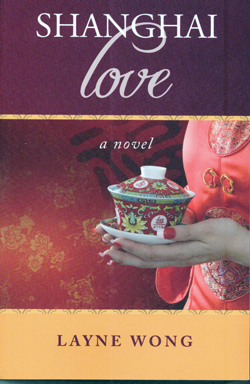Shanghai Love by Layne Wong; She Writes Press; 2013, ISBN 978-1-938314-18-6; 321 pages, $16.95.
By Donald H. Harrison

 SAN DIEGO– Peilin is a young woman from rural China, and Henry is a refugee from Nazi Germany. In this novel, they meet in the Shanghai apothecary where she is working temporarily. They are brought together because Henry, a doctor, is seeking for his patients local herbs and medicines in the absence of western pharmaceuticals.
SAN DIEGO– Peilin is a young woman from rural China, and Henry is a refugee from Nazi Germany. In this novel, they meet in the Shanghai apothecary where she is working temporarily. They are brought together because Henry, a doctor, is seeking for his patients local herbs and medicines in the absence of western pharmaceuticals.
Henry’s colleagues at the medical clinic in Shanghai disapprove of traditional Chinese remedies, and they also disapprove–perhaps even more so — of the inter-racial relationship that he is developing with Peilin. Chinese society also disapproves of the match, not only because of the racial factor but because Peilin had simultaneously become a wife and a widow before ever meeting Henry, when she was required to marry a “ghost” groom to whom she had been promised when she was a child.
This wartime Romeo and Juliet story luckily has a happier ending than Shakespeare’s classic play. As we watch the romance develop, and then become complicated by both external and internal factors, we are occasionally distracted by some historical errors that closer editing could have resolved. For example, Henry in the late 1930s talks of his concern about relatives being sent to Auschwitz but in fact the notorious concentration camp in Poland did not even open until 1940.
Author Wong is far more authoritative in writing about traditional Chinese medicine, a subject she learned from her herbalist grandfather in San Francisco and which she herself practiced as a Chinese medicine technician. This is not to say that Wong does not also have a fine understanding of J Jewish tradition, learned in the process of her own conversion to Judaism.
The story is an elegant exploration of duty to one’s family, the destructiveness of secret-keeping, and how stunting to future relationships betrayal at the hands of a lover can be. For Jewish readers the novel provides fascinating insights into Chinese religion, traditions, and culture.
For Chinese and other non-Jewish readers, the book may provide an introduction to the Holocaust and insight into the lives of Jewish refugees who made it to the other side of the world to the safe haven in Shanghai.
*
Harrison is editor of San Diego Jewish World. He may be contacted at donald.harrison@sdjewishworld.com